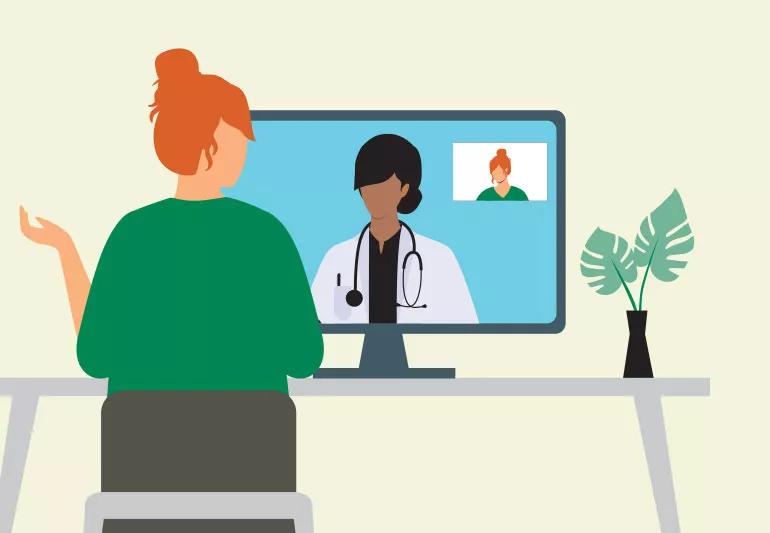An insecurity can turn into an unhealthy obsession

Image content: This image is available to view online.
View image online (https://assets.clevelandclinic.org/transform/705f4879-c92e-47ac-8495-346453b22fd5/facialDysmorphia-1334047539-770x533-1_jpg)
woman on video call and views herself in window
The last few years have been filled with online video calls for things like work meetings, doctor’s appointments, virtual classrooms and to catch up with friends.
Advertisement
Cleveland Clinic is a non-profit academic medical center. Advertising on our site helps support our mission. We do not endorse non-Cleveland Clinic products or services. Policy
While those virtual calls have become an easy way for us to stay connected, it’s also easy to see your face on screen and start criticizing your appearance. My nose is too big. Oh, I’m having a bad hair day. When did I get all these wrinkles?
“We’re in meetings and we can see ourselves on screen and so we’re just more focused on our appearance,” says psychologist Leslie Heinberg, PhD. “But even prior to that, social media with the focus on selfies and the focus on using filters have likely led to an increase in concern about our facial appearance.”
And yes, it’s natural to think about ways to improve your appearance. But for some, it can turn into facial dysmorphia, a distorted way of viewing one’s appearance. You may start thinking constantly about your “flaws” and even view yourself as “ugly.”
Dr. Heinberg discusses what causes facial dysmorphia, how it’s treated and why it’s so important to seek help.
First, it’s important to understand that facial dysmorphia is a subset of the mental health disorder known as body dysmorphic disorder (BDD).
Body dysmorphic disorder can cause you to become anxious about your body or a perceived physical defect. Most times, you may just be imagining the defect or even making more of a minor defect.
Advertisement
“With facial dysmorphia, the individual is focused on the face,” explains Dr. Heinberg. “It could be your nose or eyes. It could be that you’re concerned about wrinkles or acne. And it can even be that your face is too thin. It’s really anything about your facial appearance.”
And that concern can start to consume your life, whether that’s avoiding time with friends and family, thinking about what’s “wrong” with your features for hours each day and even turning to plastic surgery to try and improve your appearance — often with disappointing results.
Sure, we all may have things we don’t like about our appearance. But with facial dysmorphia, an insecurity can turn into an obsession.
If you have facial dysmorphia, you may:
“If you have facial dysmorphia, you may spend lots of time, money and effort on aesthetic procedures like Botox® and teeth whitening, then want more and more and more,” says Dr. Heinberg.
While there isn’t a definitive cause for facial dysmorphia, some factors can contribute to its development:
Though facial dysmorphia is most likely to occur in your early adolescence, it can happen at any age.
It’s also important to note that those with facial dysmorphia may have other disorders like eating disorders, anxiety disorders, depression and obsessive-compulsive disorder (OCD).
Facial dysmorphia and body dysmorphic disorder are typically diagnosed by a mental health professional.
“The diagnosis is based on the kind of symptoms you’re experiencing and how much those symptoms are interfering in your life,” says Dr. Heinberg.
Your doctor may recommend psychotherapy like cognitive behavioral therapy (CBT).
“It’s important to work with a mental health professional who has some degree of specialty with body dysmorphic disorders or other body image disorders,” advises Dr. Heinberg. “And psychotropic medications like antidepressants or mood stabilizers can also be helpful in reducing obsessive thoughts.”
Advertisement
Facial dysmorphia can impact you in a variety of ways. You may start avoiding social activities. It can impact your job. It can take over your life.
Alarmingly, the rate of suicide is high for those who have facial dysmorphia and body dysmorphic disorder. That’s why it’s so important to speak to a behavioral health professional and focus on your treatment.
“Facial dysmorphia is often very hard to manage on your own and you really do need the help of a behavioral health professional,” says Dr. Heinberg. “You may need medications.”
But there are some helpful steps you can take right now:
Advertisement
Whether it’s a Teams™ work call or you’re scrolling through social media, it’s key to focus on the positive parts of yourself and try not to dwell on any perceived negative factors. But if you’re struggling with staying positive and find yourself feeling anxious or depressed whenever you look in the mirror or at yourself on screen, it’s time to talk to a professional.
“Technology has been great at keeping us connected during the pandemic, but it’s just led us to be much more aware of our appearance,” says Dr. Heinberg.
Advertisement

Sign up for our Health Essentials emails for expert guidance on nutrition, fitness, sleep, skin care and more.
Learn more about our editorial process.
Advertisement
With repeat injections over time, you may be able to slow the development of new wrinkles
The procedures take different approaches to eliminate saggy, baggy skin around your eyes
Being the center of attention doesn’t mean you have to exile your guest stars
Catching and responding to passive-aggressive behavior can be difficult
These cosmetic surgery procedures can help restore your body to your pre-pregnancy form
A plastic surgeon explains what you need to know
Surgeon addresses common brachioplasty questions
Start by discussing healthy routines as well as healthy boundaries
Sweet, nutty and nutritious!
A party-pleasing side dish
Learn the benefits of a morning meal, plus five healthy food ideas to start your day right